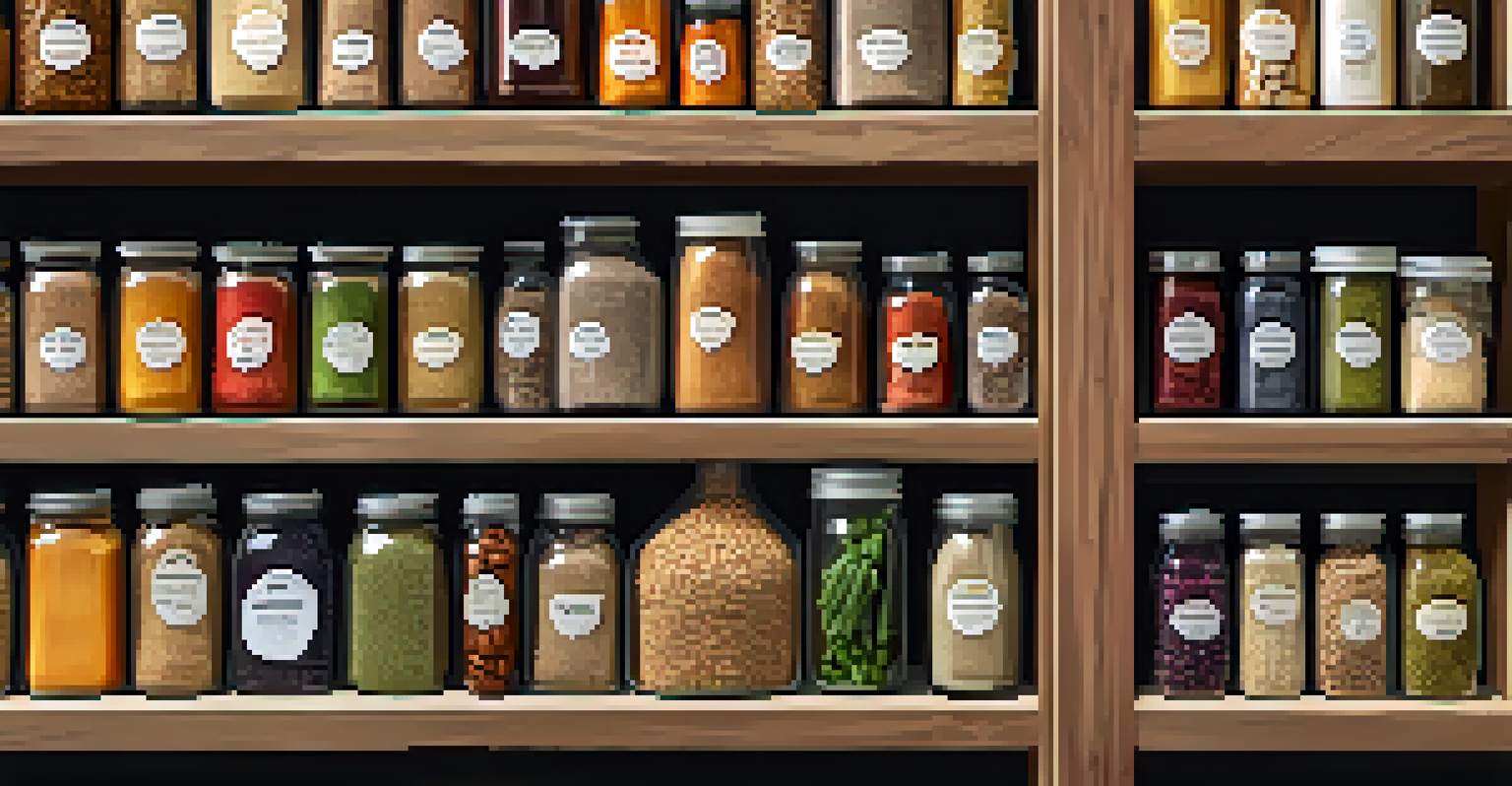Whole Foods as Medicine: Healing Through Nutritional Choices

Understanding Whole Foods and Their Benefits
Whole foods are natural, unprocessed foods that are as close to their original state as possible. Think fruits, vegetables, nuts, seeds, and whole grains, which are packed with nutrients. These foods not only nourish the body but also support overall health by providing vitamins, minerals, and antioxidants.
Let food be thy medicine and medicine be thy food.
By embracing whole foods, you can improve your energy levels, boost your immune system, and even enhance your mood. For instance, consuming a colorful array of fruits and vegetables can help fight inflammation and reduce the risk of chronic diseases. The power of these foods lies in their ability to work synergistically within the body.
Incorporating whole foods into your diet isn't just a trend—it's a lifestyle choice that promotes longevity. By choosing foods that are minimally processed, you're making a conscious decision to fuel your body with what it truly needs, leading to better health outcomes over time.
The Science Behind Nutritional Healing
Nutritional healing is grounded in the idea that food can influence health at a cellular level. Research shows that certain nutrients can help repair tissue, reduce inflammation, and even combat diseases like diabetes and heart conditions. This is where the phrase 'you are what you eat' really comes into play.

For example, omega-3 fatty acids found in fatty fish can reduce inflammation and support heart health. Similarly, the antioxidants in berries help protect cells from damage. When you choose whole foods, you’re not just eating; you’re actively participating in your health journey.
Whole Foods Boost Overall Health
Incorporating whole foods into your diet enhances energy, supports the immune system, and contributes to improved mental well-being.
Understanding how food affects your body empowers you to make informed choices. By focusing on nutrient-dense options, you can effectively support your body's healing processes and maintain optimal health.
Building a Whole Foods Pantry
Creating a whole foods pantry is the first step toward better health. Start by stocking up on staples like brown rice, quinoa, lentils, and a variety of nuts and seeds. These items serve as the foundation for countless nutritious meals and snacks.
The food you eat can be either the safest and most powerful form of medicine or the slowest form of poison.
Don't forget to include plenty of herbs, spices, and healthy oils like olive oil and avocado oil. These not only enhance flavor but also provide additional health benefits. A well-stocked pantry makes it easier to whip up wholesome meals on a busy day.
When your pantry is filled with whole foods, you’re more likely to make healthier choices. By having nutritious options readily available, you can avoid the temptation of processed snacks and fast food, keeping your body nourished and satisfied.
Meal Planning for Nutritional Success
Meal planning is a powerful tool for ensuring you stick to a whole foods diet. By planning your meals in advance, you can take the guesswork out of what to eat and minimize the chances of unhealthy choices. It’s like having a roadmap for your week!
Start by determining how many meals you’ll need for the week and what ingredients you’ll require. This not only saves time but also reduces food waste, as you’ll buy only what you need. You can even batch cook to make weeknight dinners a breeze.
Nutritional Choices Impact Emotions
The foods we consume, especially those rich in omega-3 fatty acids and antioxidants, can significantly influence our mood and emotional health.
Incorporating variety into your meal plans keeps things exciting and ensures you’re getting a range of nutrients. Experiment with different whole food recipes to discover new favorites while enjoying the healing benefits of your meals.
The Role of Gut Health in Nutrition
Gut health is a crucial aspect of overall wellness, and whole foods play a pivotal role in maintaining it. A healthy gut microbiome supports digestion, strengthens the immune system, and can even influence your mood. It’s fascinating how our gut health can impact our entire body!
Including fiber-rich foods like fruits, vegetables, and whole grains helps promote a diverse gut microbiome. Fermented foods like yogurt, sauerkraut, and kombucha can also introduce beneficial probiotics that aid digestion. A happy gut can lead to a happier, healthier you.
By focusing on whole foods, you’re not only nourishing your body but also nurturing your gut. This holistic approach to nutrition can lead to improved health outcomes and a greater sense of well-being.
Emotional Well-Being and Nutritional Choices
What we eat can significantly affect our emotional health. Whole foods, particularly those rich in omega-3 fatty acids and antioxidants, have been linked to improved mood and reduced anxiety. It's amazing how our diet can influence our mental state!
For example, colorful fruits and vegetables are not only visually appealing but also contain compounds that can elevate your mood. Foods like spinach, avocados, and bananas are great choices to help combat stress and promote feelings of happiness.
Meal Planning for Health Success
Effective meal planning allows you to stick to a whole foods diet, reduce food waste, and enjoy a variety of nutritious meals throughout the week.
By making mindful nutritional choices, you can support your emotional well-being. Incorporating whole foods into your diet can be a simple yet effective way to boost your mood and enhance your overall quality of life.
Practical Tips for Adopting Whole Foods as Medicine
Adopting whole foods into your lifestyle doesn’t have to be overwhelming. Start small by replacing one processed item with a whole food alternative each week. For example, swap white rice for quinoa or potato chips for air-popped popcorn.
Another tip is to experiment with new recipes that highlight whole foods. This can make the transition enjoyable and help you discover new flavors and textures. Don't hesitate to get creative in the kitchen—it's all part of the journey!

Lastly, remember that consistency is key. Over time, these small changes can lead to significant improvements in your health and well-being. Embrace the idea of whole foods as medicine, and you'll find that nourishing your body can be both enjoyable and rewarding.